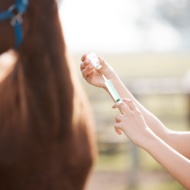Black cats more likely to enter RSPCA care
Black and black and white cats are nearly three times more likely to enter RSPCA care than tabby cats.
As National Black Cat Day (27 October) approaches, the RSPCA has revealed that black and black and white cats are more likely to enter its care than other cats.
Data released by the RSPCA shows that they are 2.7 times more likely to come into the charity's care than tabby cats. There are also 626 per cent more black cats than ginger cats in the RSPCA's care and 25 times more black than white cats.
In total, there are 676 black and black and white cats being cared for at the RSPCA's national centres.
The charity also recently revealed that black cats take three times longer to rehome than other cats.
Alice Potter, RSPCA cat welfare expert, said: “There are overwhelmingly more black and black and white cats in our care than any other coat colour - and they also take much longer to rehome, which sadly means they are staying in rescue centres for much longer periods.
“Not only is this sad for the cats who are patiently waiting for their second chance at happiness but it also means that there are limited spaces to help new cats because our centres are full of black cats which sadly no one wants to adopt.”
The RSPCA is currently experiencing what it calls a ‘rehoming crisis’. Last year, the charity took in 42 per cent more animals than were rehomed.
In response, it has relaunched its Adoptober campaign to encourage people to adopt a pet from a rescue centre rather than buying one from a breeder.
Ms Potter added: “We don’t know for sure why black cats are more likely to end up in rescue centres and are then overlooked by prospective adopters. It could be because there are more black cats than any other colour in the cat population so cats with different colours and patterns tend to stand out to adopters - but we hope many of them find their loving new forever homes this Adoptober.
“We know some people also consider them unlucky or associate them with superstition, or even think they don’t look good in Instagram photos, but, in reality, they are just like any other cat who needs a loving home.”
Image © Shutterstock



 Zoetis UK has apologised for a supply shortage of Equip Artervac, caused by a manufacturing issue.
Zoetis UK has apologised for a supply shortage of Equip Artervac, caused by a manufacturing issue.